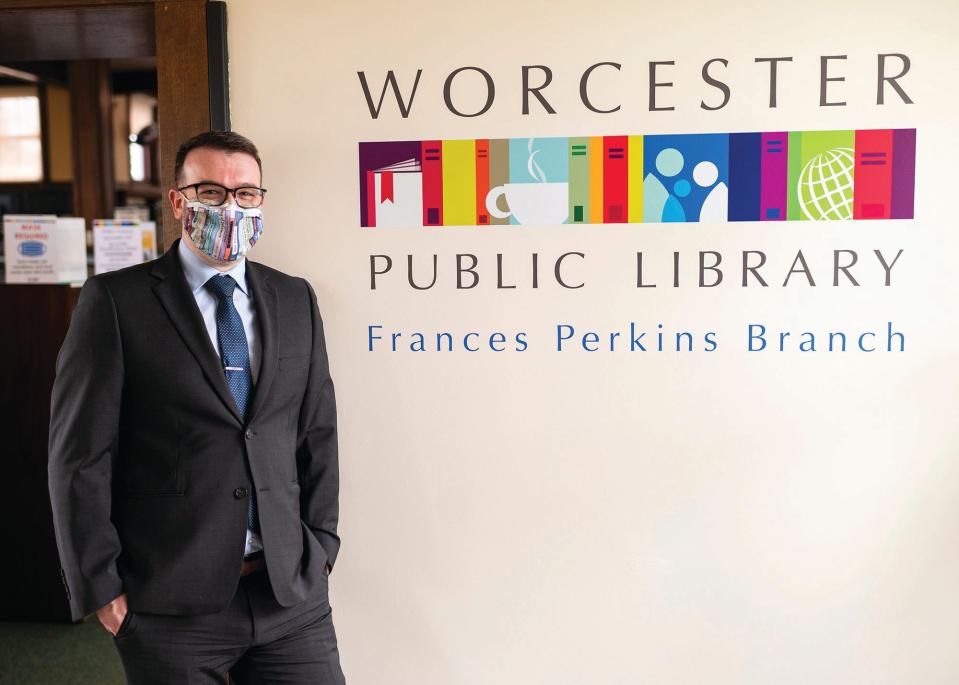Worcester library grapples with higher prices for e-books, audiobooks vs. print
WORCESTER — Ever go to your local library for the e-book copy of that new bestseller or the novel that inspired your favorite Netflix series, only to find yourself 40th on the waitlist or be told it's unavailable?
In some cases, the wait may even be shorter for the print edition than the digital.
For over a decade, as e-books have grown increasingly ubiquitous, libraries have had to contend with paying between three to five times more for an e-book or audiobook compared to what consumers pay or when buying the print version.
This is because publishing companies are able to set the price charged to libraries by e-book platforms or even embargo a product altogether. Publishers may also embargo titles for a certain period of time, such as after the release of a movie or series based on a book.
Jeannette Lundgren, executive director of the Central and Western Massachusetts Automated Resource Sharing, a library consortium in Central and Western Massachusetts including Worcester, cited audiobooks of the "Bridgerton" series, the source for the popular Netflix show, as being unavailable to libraries.
C/W MARS has also still not been able to purchase a single copy of the audiobook version of “The Summer I Turned Pretty,” another Netflix adaptation, since July of last year.

“We’re trying to use your tax dollars in the most efficient way that we can and we can’t when we need to pay significantly more than the average person,” said Jason Homer, director of the Worcester Public Library and a member of the Massachusetts Library Association’s legislative committee.
As a recent example, Homer refers to Britney Spears' autobiography “The Woman in Me,” which hit shelves late last month. Publishers charge libraries between $60 and $70 for a single digital copy of the book, said Homer, compared to the $16 to $20 for the print version.
In addition to the inflated price, a library’s purchase is temporary due to a license model, which means they can only lend out digital content for a certain amount of time or a specific number of checkouts before having to pay the same amount again. In the case of “The Woman in Me,” a library would pay as much as $70 per digital copy every two years as opposed to the one-time payment of $20 for the print edition.
Which means limited availability for patrons when their library can only afford to maintain a single copy, severely affecting accessibility to members of a community, said Lundgren.
“In today's world, libraries need to purchase things in multiple formats,” said Lundgren. “A portion of the population can’t get to the library and e-content brings the library to them.”
Even if mobility is not an issue, e-content can mean greater ease of use, such as being able to zoom in on a page, she said, meaning patrons are not limited to what the network may have available in large print.
With a limited budget to spend on e-content, C/W MARS splits its funds into three parts, Lundgren said: Purchasing new books, renewing licenses for titles in the collection and securing additional copies of particularly in-demand titles with a high waitlist.
The average wait time for an e-book or audiobook was 68 days as of October. “We try to keep it at a 20 to 1 ratio — 20 people for one copy,” she said.
The result is a very “demand-driven” collection, dictated by what is most likely to be checked out, Lundgren said.
“We’re always looking at the bottom line. If we have two years, we want to make sure it’s going to circulate and not expire without being used,” she said.
In 2023, state Rep. Ruth B. Balser, D-Newton, presented a bill that would require publishers to charge libraries the consumer rate for digital content. The bill went before the Joint Committee on Tourism, Arts and Cultural Development Oct. 30, with testimony from librarians, parents and students about why e-books are essential to communities.
“The assumption is that every public library has access to this (content) but it's still treated and priced like a novelty,” said Homer.
The set dollar amount allocated to the Worcester library by the City of Worcester to buy books has not risen to account for e-book prices, he said.
Lundgren, who also provided one of the testimonials, believes the hearing “went really well, with a lot of interest and support from committee members,” but said that this is still the first step — a vetting process and if there was enough support from the committee it will go up to the House and the Senate.
"Ultimately, we’re aware that these individuals need to make money but the fact that they charge their largest consumers (libraries) so much more is a problem,” said Homer. “We’re hoping the state passes a rule that (publishers) have to enter negotiation with us to settle those numbers and we have a voice in how much we’re paying for a product of which we are the primary consumers.”
This article originally appeared on Telegram & Gazette: Libraries grapples with high prices for e-books, audiobooks vs. print

